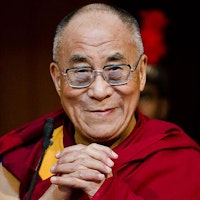Anger and hatred cannot bring harmony. The noble task of arms control and disarmament cannot be accomplished by confrontation and condemnation.
Anger and hatred cannot bring harmony. The noble task of arms control and disarmament cannot be accomplished by confrontation and condemnation.
The Dalai Lama

The Noble Task
Topic: Overcoming Adversity
Anger and hatred cannot bring harmony. The noble task of arms control and disarmament cannot be accomplished by confrontation and condemnation. Hostile attitudes only serve to heat up the situation, whereas a true sense of respect gradually cools down what otherwise could become explosive. We must recognize the frequent contradictions between short-term benefit and long-term harm.
Tenzin Gyatso, born on July 6, 1935, is known globally as the 14th Dalai Lama, the spiritual and former political leader of the Tibetan people. Born as Lhamo Thondup in a farming family in Taktser, Amdo, Tibet, he was recognized as the reincarnation of the 13th Dalai Lama, Thubten Gyatso, when he was just two years old. As the Dalai Lama, he holds the highest spiritual position within Tibetan Buddhism and is seen as a figure of great moral authority and influence. Following China's invasion of Tibet in 1950, he assumed full political power in 1950 but was forced into exile in India in 1959 after the failed Tibetan uprising against Chinese rule.
The Dalai Lama is renowned for his messages of peace, non-violence, inter-religious understanding, and compassion. He has authored numerous books and has lectured worldwide, becoming one of the most influential figures in the world of spirituality and philosophy. In recognition of his work for peace and non-violence, he was awarded the Nobel Peace Prize in 1989. Furthermore, his advocacy for the cultural and religious rights of the Tibetan people and his efforts to find a peaceful solution to the situation in Tibet through dialogue and understanding, rather than violence, have made him an internationally respected leader. Despite the political controversies and challenges, he remains committed to promoting human values and harmony among the world's religious traditions.
Wilson, Andrew, editor. World Scripture II. Universal Peace Federation, 2011, p. 1088 [Tenzin Gyatso, The 14th Dalai Lama, The Path to Tranquility: Daily Wisdom, Penguin] p. 36..

The Dalai Lama
Resources
Copyright © 2017 – 2026 LuminaryQuotes.com About Us

Tenzin Gyatso, the 14th Dalai Lama
Tenzin Gyatso, the 14th Dalai Lama was born on July 06, 1935. He likes to speak of himself as a simple Buddhist monk although he is the spiritual leader of Tibet and was awarded the Nobel Peace Prize in 1989. The Dalai Lamas are believed to be manifestations of the Bodhisattva.
The Dalai Lama Speaks About Anger and Hatred
We should begin by removing the greatest hindrances to compassion: anger and hatred. As we all know, these are extremely powerful emotions and they can overwhelm our entire mind. Nevertheless, they can be controlled. If, however, they are not, these negative emotions will plague us – with no extra effort on their part! – and impede our quest for the happiness of a loving mind.
So as a start, it is useful to investigate whether or not anger is of value. Sometimes, when we are discouraged by a difficult situation, anger does seem helpful, appearing to bring with it more energy, confidence and determination.
Here, though, we must examine our mental state carefully. While it is true that anger brings extra energy, if we explore the nature of this energy, we discover that it is blind: we cannot be sure whether its result will be positive or negative. This is because anger eclipses the best part of our brain: its rationality. So the energy of anger is almost always unreliable. It can cause an immense amount of destructive, unfortunate behavior. Moreover, if anger increases to the extreme, one becomes like a mad person, acting in ways that are as damaging to oneself as they are to others. It is possible, however, to develop an equally forceful but far more controlled energy with which to handle difficult situations.
This controlled energy comes not only from a compassionate attitude, but also from reason and patience. These are the most powerful antidotes to anger. Unfortunately, many people misjudge these qualities as signs of weakness. I believe the opposite to be true: that they are the true signs of inner strength. Compassion is by nature gentle, peaceful and soft, but it is very powerful. It is those who easily lose their patience who are insecure and unstable. Thus, to me, the arousal of anger is a direct sign of weakness.
So, when a problem first arises, try to remain humble and maintain a sincere attitude and be concerned that the outcome is fair. Of course, others may try to take advantage of you, and if your remaining detached only encourages unjust aggression, adopt a strong stand, This, however, should be done with compassion, and if it is necessary to express your views and take strong countermeasures, do so without anger or ill-intent.
You should realize that even though your opponents appear to be harming you, in the end, their destructive activity will damage only themselves. In order to check your own selfish impulse to retaliate, you should recall your desire to practice compassion and assume responsibility for helping prevent the other person from suffering the consequences of his or her acts.
Thus, because the measures you employ have been calmly chosen, they will be more effective, more accurate and more forceful. Retaliation based on the blind energy of anger seldom hits the target.
–Tenzin Gyatso, The Fourteenth Dalai Lama [Compassion and the Individual, dalailama.com].